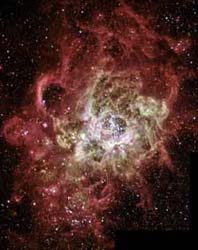 |
|
|
|
Maryland-Based Hubble
Mission to Come to an End
By Danny
Jacobs John Grunsfeld, chief scientist for the National Aeronautics and Space Administration, said repeatedly Friday that the agency is not killing the Hubble but that it will no longer service the space telescope because of budget problems and safety concerns in the wake of the shuttle Columbia disaster. Hubble -- which is managed by the Goddard Space Flight Center in Maryland -- will stay in orbit for as long as it can fulfill its duties, at which point it will be brought crashing back into Earth's atmosphere. "We will get as much life as we can out of the Hubble telescope, and we will continue to support research and analysis even after re-entry," he said, adding he expected the re-entry to occur around 2011. NASA Administrator Sean O'Keefe broke news of the "painful decision" to Hubble project management Friday morning at Goddard. Continued service for Hubble would have required expensive updates and testing to the shuttle fleet that are not required for the shuttle's only other job, working on the International Space Station. Those updates arose out of post-Columbia safety concerns: While a damaged shuttle can dock easily with the space station for repairs, there is no such fallback with the Hubble. "It was a question of looking at the risk elements involved to support the mission," Grunsfeld said. O'Keefe "made the tough decision, and I think it's the right decision." The budget-minded decision is also the first to affect an existing space mission since President Bush's announcement Wednesday that he wanted to refocus the space program. Bush called for a return to the moon by 2020, setting the stage for a permanent human presence there and possibly serving as a launching pad for manned missions to Mars and beyond. To pay for his plan, Bush wants to increase NASA funding over the next five years by $1 billion, while ordering the agency to reallocate $11 billion of its total $86 billion budget over that period. The president's plan brought cautious praise from local officials, who worried about its affect on Goddard. Rep. Steny Hoyer, D-Mechanicsville, whose district includes Goddard's home in Greenbelt, has requested "extensive briefings" in the coming weeks on the impact of the president's plan on Goddard, a spokeswoman said. Despite Friday's announcement, NASA officials said there will still be work -- including Hubble-related work -- for employees at Goddard and the Space Telescope Science Institute, which oversees Hubble's science operations from Johns Hopkins University. In fact, Grunsfeld said he has already asked scientists and engineers at Goddard to find "clever ways" to prolong Hubble's life. The Hubble team will also work on finding a way to safely "de-orbit" the observatory, which is the size of a large tractor-trailer and weighs 12 tons. Once Hubble is taken out of commission, many of its workers will design and create items for use at the space station. "It was a tough and painful decision, but given where we are now in terms of the flight of the space shuttle and the context of the national space policy outlined by President Bush, it was a decision we had to make," said Glenn Mahone, a NASA spokesman. Contracts supporting technological development of Hubble have been canceled, Mahone said, but most of that work has already been completed. Launched in April 1990 at a cost of $1.5 billion, the observatory's budget has been between $230 and $250 million a year, according to Hubble's Web site. It has traveled almost 1.5 billion miles in its orbit around the Earth, taking 330,000 pictures and observing more than 25,000 astronomical targets, the site said. Hubble is one of NASA's four "Great Observatories," along with the infrared Spitzer Space Telescope, launched in August, and the Chandra X-ray Observatory, launched in 1999. The fourth, the Compton Gamma Ray Observatory, was launched in 1991 and re-entered Earth's atmosphere in 2000. NASA's next telescope, the Webb Telescope, is scheduled for launch in 2010 and is currently managed by Goddard. "Hubble has been a wonderful instrument for us," Mahone said. "But with Webb and Spitzer now, what's coming in the future are some fantastic opportunities, and we hope to continue supplying the same level of research." Grunsfeld, a former astronaut who worked on Hubble, said it is too early to write the telescope's obituary. "The best news is that it's not over yet, that there's a lot of science left to go. The telescope has enough time left to make its next great discovery."
Last updated: 02/18/05 10:02 AM Copyright © 2004 University of Maryland Philip Merrill College of Journalism. |

